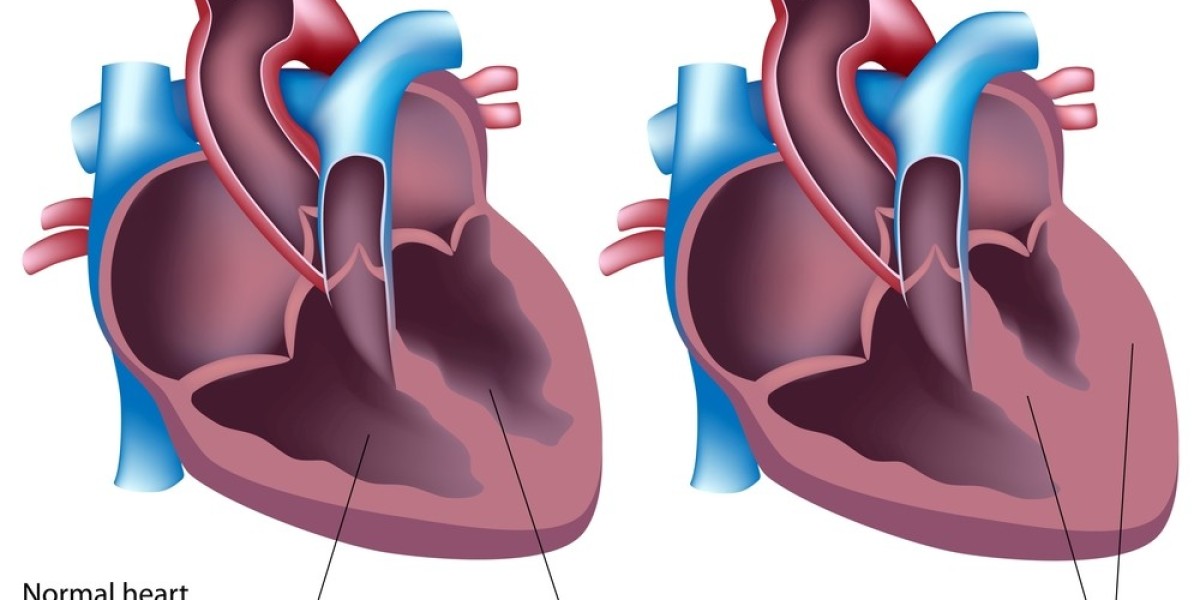I. Introduction
The Genetic Cardiomyopathies Market is experiencing a remarkable surge in growth, with a market size valued at an impressive USD 1.93 billion in 2023. This substantial figure is indicative of a field that is rapidly evolving and gaining traction within the healthcare industry. Furthermore, the market is poised for significant expansion, with a projected Compound Annual Growth Rate (CAGR) of 13.3% during the forecast period of 2024-2032. By 2032, it is anticipated that the market will reach a staggering USD 5.4 billion in value. These statistics underscore the increasing importance and potential of addressing genetic cardiomyopathies, and it is crucial to delve deeper into the dynamics of this burgeoning market.
- A. Overview of the Genetic Cardiomyopathies Market
Genetic cardiomyopathies encompass a group of inherited heart conditions that are primarily caused by genetic mutations affecting the heart muscle's structure and function. The market for genetic cardiomyopathies reflects a growing awareness and understanding of these conditions, emphasizing the urgency of addressing them, as they often go undetected until severe cardiac complications arise.
- Market Size and Growth Trends
The impressive market size of USD 1.93 billion in 2023 serves as a clear indicator of the increasing prevalence and recognition of genetic cardiomyopathies. However, what truly highlights the importance of this market is the projected growth, with a forecasted CAGR of 13.3% from 2024 to 2032. By 2032, the market's value is predicted to reach an extraordinary USD 5.4 billion, showcasing the remarkable potential for advancements in the diagnosis and treatment of genetic cardiomyopathies.
- B. Importance of Genetic Cardiomyopathies
Understanding the significance of genetic cardiomyopathies is paramount to appreciate the relevance of genetic screening and counseling for families at risk.
- Understanding Genetic Cardiomyopathies
Genetic cardiomyopathies encompass a spectrum of heart diseases that can lead to heart failure, arrhythmias, and sudden cardiac death. These conditions are often hereditary, meaning they are passed down through families. This hereditary nature necessitates a proactive approach in identifying and addressing them.
- Impact on Affected Families
The impact of genetic cardiomyopathies extends beyond the individual patient, affecting entire families. Since these conditions have a genetic basis, family members can carry the same genetic mutations, making early detection, prevention, and effective management crucial not only for the individual but for the entire family's well-being.
II. Genetic Cardiomyopathies: Genetic Basis
To fully grasp the importance of genetic screening and counseling, it is essential to delve into the genetic underpinnings of cardiomyopathies.
- A. Explanation of Genetic Cardiomyopathies
- Types and Variations
Genetic cardiomyopathies encompass various types, with hypertrophic cardiomyopathy (HCM), dilated cardiomyopathy (DCM), and arrhythmogenic right ventricular cardiomyopathy (ARVC) being among the most common. Each type is characterized by specific genetic mutations and clinical features, making precise diagnosis and targeted treatment essential.
- B. Inheritance Patterns
Understanding how genetic cardiomyopathies are inherited is fundamental in assessing family risk and guiding screening efforts.
- Autosomal Dominant
Autosomal dominant inheritance means that a single copy of the mutated gene from one parent is sufficient to cause the condition. Consequently, offspring of affected individuals have a 50% chance of inheriting the mutation, highlighting the importance of early detection and intervention in families with a history of genetic cardiomyopathies.
- Autosomal Recessive
Autosomal recessive inheritance necessitates the inheritance of two mutated genes, one from each parent, to manifest the condition. Often, parents are carriers without exhibiting any symptoms themselves. Identifying carriers within a family is crucial for assessing the risk of future generations.
- X-linked
X-linked inheritance involves genes located on the X chromosome. Males are more commonly affected due to having only one X chromosome, while females can be carriers. This unique inheritance pattern emphasizes the importance of genetic counseling and screening to identify carriers and at-risk individuals within families.
- C. Risk Factors
Identifying risk factors associated with genetic cardiomyopathies is pivotal in targeting at-risk families and individuals effectively.
- Family History
A strong family history of cardiomyopathies increases the likelihood of inheriting the condition. Recognizing affected family members is a critical step in assessing risk and implementing preventative measures.
- Ethnicity
Certain ethnic groups may have a higher prevalence of specific genetic cardiomyopathies due to genetic variations within those populations. Understanding these ethnic-specific patterns aids in targeted screening and intervention efforts.
- Gender
In some cases, gender can influence the likelihood of developing and inheriting genetic cardiomyopathies. This gender-specific consideration underscores the need for personalized screening and counseling approaches.
III. Early Genetic Screening
Early genetic screening plays a pivotal role in identifying individuals at risk and initiating appropriate interventions, thus preventing or delaying the onset of cardiac complications.
- A. The Role of Genetic Screening
- Identifying At-Risk Individuals
Genetic screening serves as a proactive approach to identifying individuals who carry genetic mutations associated with cardiomyopathies, even before symptoms manifest. This early detection can lead to timely intervention and improved outcomes, ultimately saving lives.
- Importance of Early Detection
Early detection is crucial because some genetic cardiomyopathies can progress silently, with symptoms only becoming apparent when significant damage to the heart has already occurred. Timely intervention can prevent or delay the onset of cardiac complications, significantly improving the quality of life for affected individuals.
- B. Genetic Testing Methods
Several genetic testing methods are available to identify mutations associated with cardiomyopathies.
- DNA Sequencing
DNA sequencing involves reading the genetic code to identify specific mutations associated with cardiomyopathies. This method is highly accurate and provides comprehensive genetic information.
- Genetic Panels
Genetic panels target a specific set of genes known to be associated with cardiomyopathies. These panels are particularly useful for targeted screening when the genetic mutation is known within a family or population.
- Whole Exome/Whole Genome Sequencing
Whole exome sequencing examines all protein-coding genes (exons) in an individual's genome, while whole genome sequencing looks at the individual's entire genetic code. These comprehensive approaches can identify novel mutations and provide a more complete genetic profile.
- C. Screening Guidelines
- Recommendations for At-Risk Families
Various medical organizations and expert groups provide guidelines for genetic screening in at-risk families. These guidelines help healthcare professionals determine who should undergo genetic testing and when. Implementing these guidelines ensures that screening efforts are targeted and effective.
- Age Considerations
Screening recommendations may vary based on age and family history. Understanding when to initiate screening is essential for effective risk assessment. For example, some guidelines recommend earlier screening for children born into families with a history of genetic cardiomyopathies to enable early intervention.
IV. Genetic Counseling
Genetic counseling plays a vital role in helping individuals and families navigate the complexities of genetic cardiomyopathies, offering both information and emotional support.
- A. Definition and Purpose of Genetic Counseling
- Supporting Informed Decision-Making
Genetic counseling aims to provide individuals and families with the information and support they need to make informed decisions about genetic testing, risk assessment, and healthcare options. It serves as a critical resource for ensuring that individuals and families are well-prepared to make choices that align with their values and preferences.
- Psychological and Emotional Support
In addition to providing information, genetic counselors offer invaluable emotional support. The process of genetic testing and confronting hereditary conditions can be emotionally challenging, and genetic counselors are trained to provide guidance and empathetic assistance throughout this journey.
- B. The Role of Genetic Counselors
- Education and Information
Genetic counselors are highly trained professionals who specialize in genetics and counseling. They educate patients and families about the genetic basis of cardiomyopathies, the implications of genetic testing, and the available treatment options. This education empowers individuals and families to make informed decisions regarding their healthcare.
- Risk Assessment
Genetic counselors assess an individual's risk of developing or passing on cardiomyopathies based on family history and genetic testing results. This risk assessment is a crucial component of the genetic counseling process, allowing individuals to better understand their genetic risks.
- Family Counseling
Genetic counselors often work with entire families to help them understand their risk collectively. This family-centered approach ensures that everyone affected or at risk is adequately informed and supported.
- C. Benefits of Genetic Counseling
- Improved Understanding of Genetic Risks
Genetic counseling enhances individuals' and families' understanding of their genetic risks, enabling them to make informed decisions about their healthcare. This increased awareness empowers individuals to take proactive steps to manage their health effectively.
- Informed Healthcare Decisions
Armed with knowledge about their genetic risks, patients and families can make decisions about genetic testing, preventive measures, and treatment options that align with their values and preferences. Informed healthcare decisions lead to more personalized and effective care.
- Psychosocial Support
The emotional and psychological support provided by genetic counselors is invaluable in helping individuals and families cope with the challenges of living with or being at risk of genetic cardiomyopathies. Navigating the complexities of hereditary conditions can be emotionally taxing, and genetic counselors are trained to provide the necessary support and guidance.
V. Ethical and Legal Considerations
Genetic screening and counseling raise important ethical and legal questions that must be addressed to ensure the responsible use of genetic information.
- A. Privacy and Confidentiality
Protecting the privacy and confidentiality of genetic information is paramount. Healthcare providers and institutions must adhere to strict standards and safeguards to protect this sensitive data. Ensuring that genetic information is not disclosed to unauthorized individuals is essential to maintain trust and protect individuals' rights.
- B. Informed Consent
Obtaining informed consent is an ethical requirement in genetic testing. Individuals must be fully informed about the implications of genetic testing, including the potential outcomes and limitations, before undergoing the procedure. Informed consent ensures that individuals make decisions about their genetic information voluntarily and with a clear understanding of the associated risks and benefits.
- C. Non-Discrimination Laws (e.g., GINA)
Laws like the Genetic Information Nondiscrimination Act (GINA) in the United States protect individuals from genetic discrimination by employers and insurers based on their genetic information. These laws are essential for ensuring that individuals can undergo genetic testing and counseling without fear of adverse consequences in their employment or insurance coverage.
- D. Ethical Dilemmas in Genetic Counseling
Genetic counselors may encounter ethical dilemmas in their practice, particularly when it comes to disclosing certain information or balancing the interests of different family members. These dilemmas highlight the complex nature of genetic counseling and the importance of ethical training and guidance in the profession.
VI. Challenges and Future Directions
While genetic screening and counseling offer great promise, they also face challenges and opportunities for growth in the ever-evolving field of genetics and healthcare.
- A. Access to Genetic Testing and Counseling
Access to genetic testing and counseling services can be limited in certain regions or among specific populations. Disparities in healthcare access must be addressed to ensure that individuals and families at risk of genetic cardiomyopathies have equitable access to these essential services.
- B. Cultural and Ethical Sensitivity
Healthcare providers must be culturally sensitive and respectful of diverse beliefs and values when delivering genetic counseling services. Cultural competence is essential to ensure that individuals from different backgrounds receive care that aligns with their cultural and ethical perspectives.
- C. Advancements in Genetic Screening Technologies
Advancements in genetic screening technologies, such as improved accuracy, affordability, and accessibility, are continually expanding the possibilities for early detection and prevention. The integration of cutting-edge technologies, such as next-generation sequencing, is making genetic testing more comprehensive and accessible, ultimately benefiting individuals and families at risk of genetic cardiomyopathies.
- D. Research in Genetic Cardiomyopathies
- Emerging Treatments and Therapies
Research in genetic cardiomyopathies is yielding promising treatments and therapies that have the potential to revolutionize treatment approaches. Emerging therapies, including gene-based interventions and precision medicine, are providing new hope for individuals with these conditions.
- E. Potential Impact of Genetic Counseling on Healthcare Costs
By identifying at-risk individuals early and helping them make informed decisions about their healthcare, genetic counseling has the potential to reduce healthcare costs associated with late-stage cardiac complications. Preventing or delaying the onset of severe cardiac events can lead to cost savings within the healthcare system, making genetic counseling not only beneficial for individuals but also cost-effective from a healthcare economics perspective.
VII. Case Studies and Success Stories
Real-life examples and case studies can illuminate the positive impact of genetic screening and counseling on individuals and families facing genetic cardiomyopathies.
- A. Real-Life Examples of Families Benefitting from Genetic Screening and Counseling
Sharing compelling stories of families who have undergone genetic counseling and testing can provide valuable insights into the practical benefits of these services. These real-life examples can serve as inspiration and motivation for others to seek early intervention and make informed decisions about their healthcare.



